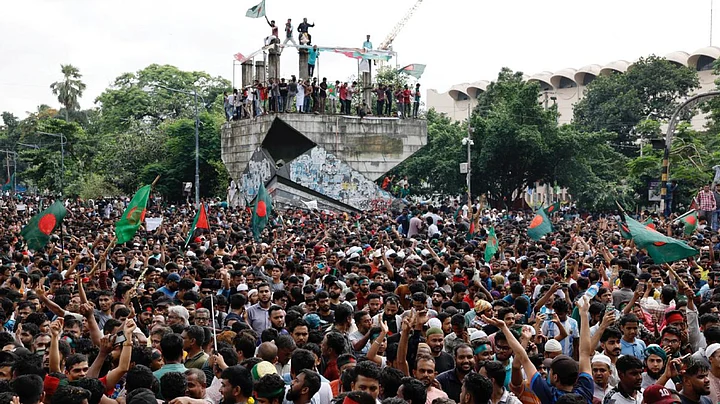The Bangladesh Jamaat-e-Islami was banned abruptly by the now-ousted Sheikh Hasina government on 1 August, only to be reversed in less than a month by the interim government led by Muhammad Yunus on 28 August.
The Jamaat is known as a political movement in our part of the world for many reasons, but its role during Bangladesh’s 1971 War of Liberation must be the most profound and the most controversial one.
The Jamaat is an old party, older than many other political parties in Bangladesh. It's older than the Awami League and the Bangladesh Nationalist Party (BNP). When we talk of its anti-independence role, in favour of keeping Pakistan intact in 1971, many of us miss out on its long battle opposing the very concept of Pakistan in the 1940s and its subsequent formation in 1947.
A historical perspective is crucial to understanding what’s happening in the country today with respect to the Jamaat’s existence as a political party in independent Bangladesh.
Founded in Lahore on 26 August 1941 in pre-partition British India, the Jamaat-e-Islami opposed the creation of a separate state of Pakistan for the Muslims of India. It also did not support the Muslim League, then the largest Muslim party, in the election of 1946.
The Jamaat actively tried to prevent the Partition, arguing that the concept violated the Islamic doctrine of the ummah, ie, a temporal border that would divide Muslims from one another. Once Pakistan was created, it was divided into separate Indian and Pakistani national organisations, and later, the East Pakistan wing of the Jamaat-e-Islami Pakistan became the Bangladesh Jamaat-e-Islami.
The Jamaat participated in the democratic movement in Pakistan during the Martial Law period declared by General Ayub Khan. Along with two the forerunners of the Bangladesh movement, Maulana Abdul Hamid Khan Bhashani and Sheikh Mujibur Rahman, the head of its East Pakistan wing Ghulam Azam was also a member of an all-party democratic alliance (the Democratic Action Committee) formed at that time.
However, the Jamaat's ideological stance and many of its leaders and members’ active role in crimes against humanity during Bangladesh’s fight for independence made it quite controversial, to say the least, subsequently prompting the Bangabandhu government to ban the party.
The democratic spirit soon evaporated in the newly formed Bangladesh and the first government eventually banned all political parties, declaring Bangladesh a one-party state in early 1975. Thanks to President Ziaur Rahman’s adherence to multi-party democracy, political parties of all shades and colours, including the Jamaat, resurfaced.
Sheikh Hasina’s Awami League, which once championed the cause of democracy in freeing the country from military dictator HM Ershad, always found friends in the Bangladesh Nationalist Party (BNP) and the Jamaat to advance the cause of democracy during the 1980s.
Even in the early 1990s, when the BNP and its leader Khaleda Zia were steering Bangladesh’s first post-Ershad government, Hasina’s Awami League had no hesitation in bringing the Jamaat on board for waging a united movement against the former.
Indeed, the Awami League, which always preferred invoking the ‘spirit of the Liberation War’ in domestic politics and frequently played the ‘Razakar’ card against dissenters (to the extent that it became Bangladesh’s equivalent of the Philippines’ red-tagging), never had a problem going for a marriage of convenience with the Jamaat, whose key leaders were accused of war crimes in 1971 (the Razakar was a paramilitary force in East Pakistan organised by General Tikka Khan, drawing force from Jamaat adherents and widely accused of killing freedom fighters and committing other atrocities).
But then again, friendship with the Jamaat was never an exclusive privilege that only the Awami League had. Other parties, including the BNP, had their fair share of camaraderie whenever they were required to fortify their force in the fight against the Awami League. It made the Jamaat an essential salt in Bangladesh’s political curry.
To many Bangladeshis, Hasina’s watershed moment in politics was her success in taking war crime offenders to trial, including some key figures of the Jamaat leadership.
To many others, the trial process was controversial. But the point here is that the argument or the logic her government had applied in handing down punishment to the Jamaat leaders, the same was not applied in banning it as a party. If the Hasina government wanted, it could have tried the Jamaat as an organisation for its role in 1971.
But what Hasina and her administration did was invoke a clause of the Anti-Terrorism Act of 2009. That made all the difference. The people of the country, who were very much drawn into the 'Monsoon Revolution' in July, spearheaded by the revolutionary students of Bangladesh, found the Awami League’s move to suddenly ban the Jamaat amidst the anti-government movement a ploy to divert public attention.
Invoking the all too familiar overused ‘weapons’ like the 'spirit of liberation' and 'razakar-tagging' ultimately proved to be ineffective and totally counterproductive. Banning the Jamaat just added fuel to the inferno that helped the Monsoon Revolution be a success.
Now, the interim administration of Professor Muhammad Yunus has rescinded the ban. While invoking the Anti-Terrorism Act to ban it during her last days in government, Hasina tried to depict that the killings that occurred during the students’ movement were committed by the Jamaat.
But after some scrutiny, the new government claimed, according to a notice issued by the Ministry of Home Affairs, that it found the accusation to be an utter lie and that the Hasina government's law enforcement agencies and armed cadres were responsible for most of the casualties.
(Reaz Ahmad is the Executive Editor of the Dhaka Tribune. This is an opinion piece and the views expressed are the author’s own. The Quint neither endorses nor is responsible for them.)
(At The Quint, we question everything. Play an active role in shaping our journalism by becoming a member today.)
